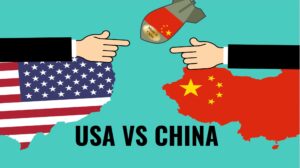Update: Tension with China continue to heat up with a suspected Chinese spy balloon floating over the US. These are some still relevant ideas we had last year for limiting the impact China can have on us.
Few countries have the power to flex at other nations like China. China has made some incredible moves over the last couple of decades. “Made in China” went from a joke about poor quality to nearly impossible to avoid. Their supply chain is crucial to not just every nation but also to millions of products. However, their crucial supply chain creates a perfect choke point to control nations and is fraught with abuse. It’s time to advocate for change.
China is the most populated country on the planet. It has 1.44 billion citizens. Just behind them is India with 1.38 billion. The third largest country in the world is the United States, with a measly population of 331 million. At over four times the size of the United States, it’s no wonder they have such influence.
If a war started between China and any other nation, would they stand a chance against such a large population? Even if someone won a war against China, would winning throw us back into the 1800s?
The solution to the China problem cannot be war. Nations do not want to engage China directly. The economic fallout alone from a war with China would be disastrous. However, with a strong enough grassroots effort, we can break the iron grip China holds on our nation.
China’s Current Human Rights Abuse
China has a history of mistreating many people groups, including their own citizens. From a previously forced one child policy to extreme surveillance and censorship, there are more than enough moral reasons alone to cut our reliance on China.
“Reeducation Camps”
The BBC did an inside documentary on reeducation camps in China. To say it was alarming is an understatement. China forces their own citizens into camps and requires them to pledge their allegiance daily to the Chinese Communist Party. The women reported being sexually abused, raped, and tortured. China has reportedly forced the Uighurs into reeducation camps to be monitored, indoctrinated, and even sterilized.
The Africa Invasion
China has been providing loans for monumental projects to many countries throughout Africa. However, there are strings attached. China has built over 186 government buildings in Africa. The large majority of the 4G networks they have built in Africa operate on Huawei (the Chinese phone brand plagued in controversy).
When they inspected the server rooms given to the Africa Union, they found large amounts of confidential files and audio recordings from bugged rooms were being sent in the middle of the night through backdoor access to Shanghai, China.
Forced Organ Harvesting
The United Nations is currently making recommendations for dealing with forced organ harvesting being performed in China.
Other Abuses by China Include:
Vanishing People
Individuals that speak out against the Chinese Communist Party (CCP) have a tendency to disappear.
Hong Kong
Hong Kong should have remained free from China for many more decades. We all know how that worked out.
Mass Censorship
With some of the heaviest mass-surveillance and government control of any country, it’s hard to imagine there isn’t much going on inside (or outside) China that communist party isn’t aware of.
In 2021, they forced several religious apps off Apple’s App Store, including the Bible.
Preventing the China War
Diplomacy Will Have a Limited Effect
Diplomatic deals will be difficult to implement. Diplomacy has its advantages; however, dealing with a country responsible for such vast quantities of our imported goods will be a massive undertaking. Relying so heavily on any nation creates a huge national security concern.
The United States traded with China at a deficit of $396.6 billion in 2021. The year 2021 saw an over 25% increase in that deficit compared to 2020.
Instantly cutting off our largest supplier would have disastrous consequences. However, a gradual change can lessen the blow while showing China we care enough about working conditions and human rights to change our purchasing habits.
We Can Strengthen Our Resilience by Diversifying Our Markets
We’ve been told to “diversify our 401K’s” and “never carry all our eggs in one basket”. However, China’s promise of cheap labor was too good to pass up. So much of our supply chain is from China that it’s difficult to imagine us ever functioning without them.
By easing our manufacturing into other countries, we can diversify our supply chain. A diversified supply chain allows competition and gives each nation less of an iron fist grasp over us.
The supply chain crisis has already led several corporations to rethink their strategy. Intel is building a 20 billion dollar computer chip factory here in the United States.
Raising Awareness Isn’t Enough
We will make our voices heard on social media; we will march in the streets for social justice, child labor, and unsafe working conditions. That’s the straightforward part. To truly send a powerful message acting on the issues is essential. It’s going to take more than words.
Look at the manufacturing sticker when you’re purchasing an item. Can you find a product from a country with a better reputation than China? While it may seem like everything comes from China, by turning over different brands of the same item, you can find quite a few different countries represented.
Buy Made in America
Tightly regulated working conditions allow laborers to operate in safe and ethical conditions in the United States.
Purchasing made in America products helps with domestic job creation and growth. It results in less pollution and ensures the employees are working in safer conditions. It empowers our own economy.
Boycotting Made in China
It is difficult to buy only made in the USA products. Boycotting, or at least avoiding, products made in China are one of the best ways we can send a message to corporations that we care about working conditions, human rights violations, and country policies.
By voting with our pocketbooks, we let companies know we will pay more for a product that is ethically produced.
The Wake-up Call From Covid-19
Stocking up on essentials can really lessen the anxiety level when rumors fly of sanctions, supply chain bottlenecks, and war.
Preparing for a power outage
Preventing and surviving a cyber attack
Covid became a huge stress test for the world supply chain. It identified many problems. Having most of your essentials manufactured in one country quickly proved how disastrous it is to rely on one nation or supply line for a critical resource.
Much of the PPE required for hospital staff was manufactured in China. As the desperation grew, unsafe products flooded the markets. In fact, 70 percent of “N95s” certified in China don’t meet United States standards according to WebMD.
You’re Just Being Xenophobic and Anti-Asian
At some point, this will be brought up. Today, it is much easier to call people names than to address the problem.
A recent report shows an increase in Asian hate crimes by 164% in the first quarter of 2021 in the United States compared to the first quarter of 2020. Data taken from 16 cities showed the number of incidents reported that quarter went from 36 to 95. This is unacceptable. Every race deserves respect and love.
Using this argument moves the issues to something easier to address. I can yell at a person online and feel better about myself and ignore the actual problem.
The intent of this article is not to promote hate but to drive change. By pushing for change, we can hopefully improve not only our resilience but also the quality of life for the Chinese.
Are We Blameless?
Every country has its problems. Including our own. .
Many of our atrocities have been called out. Systemic failures of society should concern everyone. Thankfully, in America, we have a process to bring justice and change the process. Unlike China, the United States still puts efforts into rectifying the situation. Thankfully, in America, an individual suspiciously dying in a closely monitored cell is the anomaly and not the norm.
Preventing a Disastrous Chinese War May Come Down to Us as Individuals
While a nation’s leaders’ actions are limited, there is a solution. Much of the economic impact China has on us is self-induced. Time and time again, we choose the slightly cheaper item made in China. Each purchase is a small vote saying I agree with reeducation camps, the violent takeover of nations, and the disregard for human life.
By purchasing products made elsewhere, we send a message to China, to politicians, and to CEOs that we will not support China’s policies with our pocketbooks. When the bottom line is affected, companies and perhaps even stubborn nations will reconsider their choices and change course.
Wars rarely have winners. Both sides walk away with heavy casualties. By modifying our spending, we can drive a sustainable change. That change will reshape our economy to become more resilient and encourage the safety of Chinese citizens.
Join our email to hear about new resources to help you stay on top of severe weather outbreaks
- How to Shelter in Place During a Nuclear Event
- How to sleep in your car overnight
- How to prepare for power outages
- Preparing for Severe Weather
- Faith in Action: Responding to Trump’s Reduction in Humanitarian Aid
- How to Help Someone Who is on Fire
- How To Get Help When 9-1-1 Is Down
- Does a Solar Eclipse Really Warrant a State of Emergency?
- The Coming Digital Apocalypse?
- Disaster Survival: Do These 3 Things Within 60 Seconds
- 5 Disaster Relief Tips for a Major Earthquake Response
- Can We Shoot the Chinese Balloon Down?
- Incident Management Team: Tips for a Successful Deployment
- TC001 Best New Thermal Camera? Review for TOPDON TCView
- 5 Ways To Stop Overpaying For Healthcare
- Preparing Your Pets for Disaster


















I and some of the people I’ve worked with over the years have been preaching ‘buy made in USA’ for over 50 years and it seems many don’t care as long as they get what they want and save a nickel. People seem not to be concerned until it affects them personally. Our government can get us into war whether we the people want it or not, or they send the alphabet agencies to do their private wars and assassinations.